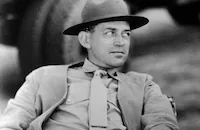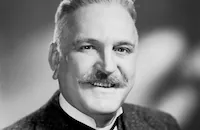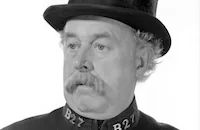Rosalie

Brief Synopsis
Cast & Crew
W. S. Van Dyke Ii
Nelson Eddy
Eleanor Powell
Frank Morgan
Edna May Oliver
Ray Bolger
Film Details
Technical Specs

Synopsis
Princess Rosalie of Romanza, secretly enrolled at Vassar, has a crush on West Point football star Dick Thorpe, though she pretends to dislike him. They fall in love, but their romance is interrupted when her father summons her home to marry Prince Paul, who really loves Rosalie's friend Brenda. After Rosalie reluctantly returns home, Dick flies his private plane solo across the Atlantic, hoping to keep a rendezvous with Rosalie, who has said that she will be dressed as "Pierrette" during a Romanzan festival. Meanwhile, his friend, Bill Delroy, sails to Europe but tries to impress his girl friend Mary Callahan by saying that he, too, was in the plane. At the festival, Rosalie performs a magnificent dance dressed as Pierrette, and Dick recognizes her. However, when Dick learns that she is not only a princess, but engaged to marry Prince Paul, he leaves the country. That same night a revolution erupts and the royal family escapes. When they learn that the revolt has been quelled, however, they plan to return soon to Romanza. In the United States, the royal family visits West Point and Rosalie demands that Dick be her official escort, even though he is about to be expelled from school for being absent without leave. Rosalie cannot convince him that she wants to abdicate until, with the Bill's help, she disguises herself as a cadet and meets him in the garden to confirm what Brenda has told him, that Prince Paul and Rosalie are not in love. Meanwhile, young Mickey, the school mascot, visits the affable king, disguised as the monarch's pet dummy and convinces him to abdicate so that he and Rosalie can be happy living in America. The queen is horrified, but the king is adamant. Rosalie and Dick are then married.

Director

W. S. Van Dyke Ii
Cast

Nelson Eddy

Eleanor Powell

Frank Morgan

Edna May Oliver

Ray Bolger

Ilona Massey

Billy Gilbert

Reginald Owen
Tom Rutherford

Clay Clement

Virginia Grey

George Zucco
Oscar O'shea
Jerry Colonna

Janet Beecher

William Demarest
Tommy Bond
Gene Conklin
Tudor Williams
Joe Marks
Alexander Canepari
Camille Soray
Lois Clements
The Esquires
George Boyce
Harry Masters
Dave White
Marie Arbuckle
Bernice Alstock
Elinor Coleson
Grace Neilson
Barbara Whitson
Crew
Leo Arnaud
Pop Arnold
Murray Cutter
Roger Edens
William Edmondson
Frank Floyd
Cedric Gibbons
Dave Gould
John Greer
William Grimes
George King
Marjorie Lane
Paul Marquardt
Oliver T. Marsh
William Anthony Mcguire
William Anthony Mcguire
Mike Mclaughlin
Frank Messenger
Cole Porter
Merrill Pye
Leonid Raab
Albertina Rasch
William Scully
Blanche Sewell
Douglas Shearer
Leonard Smith
William Steinkamp
Georgie Stoll
Herbert Stothart
Count Andrey Tolstoy
Dolly Tree
Slavko Vorkapich
Edwin B. Willis
Joseph Wright
Ted Wurtenberg
George Yohalem

Film Details
Technical Specs

Articles
Rosalie
Rosalie first hit the boards in 1927 in a lavish Flo Ziegfeld production starring Marilyn Miller as the middle European princess who becomes Americanized by love for a West Point cadet. The story had been inspired by two recent news events: Lindbergh's solo flight across the Atlantic (the West Pointer flies to Europe to be with his ladylove) and the New York visit of Queen Marie of Romania. Allegedly Ziegfeld was not all that enthusiastic about the show, only producing it because his mother had been named Rosalie. Much to his surprise, it became one of the hits of the year.
MGM originally acquired the show as a vehicle for Marion Davies, but though she completed a film version, the studio decided not to release it. Sources disagree as to whether any of her version was used in the 1937 rendition that did make it to movie theatres. If any of it did, footage of its blonde star would have been missing, as the title role was taken over by the studio's new dancing sensation, the decidedly brunette Eleanor Powell. But she never got to dance to the original score that combined tunes by Sigmund Romberg and George Gershwin (the latter writing the show's biggest hit, "How Long Has This Been Going On"). MGM scrapped their numbers in favor of a new score by another great Broadway tunesmith, Cole Porter.
Although dancing star Powell seemed a strange match for classical baritone Nelson Eddy (who was usually paired with Jeanette MacDonald in the sort of musicals which had made him a star), Porter came up with a winning combination of hot rhythm numbers for her and more traditional ballads for him. In the latter category was the film's one enduring standard, "In the Still of the Night." Oddly, Eddy didn't want to sing it. He considered the melody too unconventional and didn't think audiences would take to the song's unusually long melodic line. Usually, Porter would have adapted his score to the star's taste, but he felt this song was too good to lose, so he appealed to studio head Louis B. Mayer, who was moved to tears by the number. On his orders, it stayed in the picture.
Mayer also exercised his influence over the film's title number. Porter tried five times to come up with a musical tribute to the leading lady that Mayer would buy, but the mogul found each version too highbrow. Finally, the composer turned out the simplest number he could come up with; some biographers have suggested he deliberately tried to write a bad song. Not only did Mayer love it, but it went on to become a big hit. Porter finally changed his mind about the song when fellow songwriter Irving Berlin advised him, "Listen, kid, never hate a song that has sold a half-million copies."
The critics weren't much more enthusiastic about the film than Porter had been about its title song. Writing in The New York Times, Bosley Crowther called it "one of the most pretentious demonstrations of sheer mass and weight since the last Navy games." Years later, Pauline Kael quipped, "the sets are to make a person of taste weep." But the public loved it. Drawn by the hit songs, the popularity of Powell and Eddy, and a lavish production in the grand style, they made Rosalie one of MGM's top box-office hits of the year.
Producer: William Anthony McGuire
Director: W.S. Van Dyke
Screenplay: William Anthony McGuire
Based on the Play by William Anthony McGuire and Guy Bolton
Cinematography: Oliver T. Marsh
Art Direction: Cedric Gibbons
Music: Herbert Stothart
Cast: Nelson Eddy (Dick Thorpe), Eleanor Powell (Rosalie), Ilona Massey (Brenda), Ray Bolger (Bill Delroy), Frank Morgan (King Frederic), Edna May Oliver (Queen), Billy Gilbert (First Officer), Reginald Owen (Chancellor), George Zucco (General Maroff), Virginia Grey (Mary Callahan), William Demarest (Army's Coach), Jerry Colonna (Second Officer), The Albertina Rasch Dancers.
BW-124m.
by Frank Miller

Rosalie
Virginia Grey (1917-2004)
She was was born in Los Angeles on March 22, 1917, and was exposed to the film industry at a very young age. Her father, Ray Grey, was a Keystone Cop and acted in several other of Mack Sennett's comedies with the likes of Mabel Normand, Dorothy Gish and Ben Turpin. When her father died when she was still a child, Virginia's mother encouraged her to join the acting game and audition for the role of Eva for Uncle Tom's Cabin, a big budget picture for Universal Studios in the day. She won the role, and acted in a few more pictures at the studio: The Michigan Kid and Heart to Heart (both 1928), before she decided to temporarily leave acting to finish her schooling.
She returned to films after graduating from high school, and after bouncing around Hollywood doing bits for various studios, she hooked up with MGM in 1938. Her roles in her first few films were fairly non-descript: In Test Pilot and Ladies in Distress (both 1938), she did little more than look pretty, but in the following year she had scene-stealing parts in The Women (upstaging Joan Crawford in a delicious scene as a wisecracking perfume counter girl) and as the suffering heroine in Another Thin Man (both 1939).
Despite her versatility (she could handle comedy or drama with equal effectiveness), MGM would cast her in some above-average, but hardly starmaking movies: Whistling in the Dark, The Big Store (both 1941), and Tarzan's New York Adventure (1942). She left MGM in 1943 and became a freelance actress for several studios, but her material as a leading lady throughout the '40s were mediocre: Swamp Fire, House of Horrors (both 1946), and Mexican Hayride (1948) were sadly the more interesting films in her post-MGM period. But by the '50s she was a well-established character actress, appearing in fairly big-budget pictures: All That Heaven Allows, The Rose Tattoo (both 1955), Jeanne Eagels (1957).
In the '60s, Grey turned to television and found work on a variety of hit shows: Wagon Train, Peter Gunn, Bonanza, My Three Sons, I Spy, and several others; plus she also captured a a couple of notable supporting parts in these films: Madame X (1966), and Airport (1970), before retiring completely from acting in the early '70s. She is survived by her sister, Lorraine Grey Heindorf, two nieces and two nephews.
by Michael T. Toole
Virginia Grey (1917-2004)
Quotes
Why are cheering so loud?- Brenda
We're in America. We have to act like the Americans do. Besides, I like it. Come on, NAVY!- Rosalie
Trivia
There were several dance numbers cut before the movie was released. The football game at the beginning was cut from several newsreels. Over 100 original West Point students appeared in that movie, and there are rumours that each of them who took part in one dance number, received a kiss by Eleanor Powell.
The electricity bill for the Drum Dance scene was, according to some rumours in the region of $30,000. According to some sources 1,500 extras were used in the Drum Dance scene, making the costumes for them took almost a month.
The original play opened in New York on 10 January 1928. It was a musical for which William Anthony McGuire and Guy Bolton wrote the book. Despite the moderate success (335 performances) and the powerhouse composers (George Gershwin and Sigmund Romberg) and lyricists (Ira Gershwin and P.G. Wodehouse), MGM decided to have Cole Porter write an entirely new score for the movie. Marilyn Miller starred in the musical, and Frank Morgan (I) originated his role of the king.
Notes
Additional music used briefly in various segments of the film included, "The Polovetzian Dances" by Alexander Borodon; "M'Apari," from the opera Martha, by Friedrich Flowtow; "Stars and Stripes Forever" by John Phillip Sousa; "Oh, Promise Me" by Reginald De Koven and Clement Scott; "The Caissons Go Rolling Along" by Edmund L. Gruber; and, "Anchors Away" by Charles A. Zimmerman, Alfred A. Miles and Royal Lovell. Frank Morgan recreated his role from the Broadway production of the play, which was produced by Florenz Ziegfeld and starred Marilyn Miller in the title role. Although the play was a musical, an entirely new score was written for the film. A production chart in Hollywood Filmograph on May 24, 1930 listed an M-G-M film entitled Rosalie "in preparation." That film was to star Marion Davies and be directed by Robert Z. Leonard. It is possible that the planned 1930 production was also to be based on the Broadway play, however, no additional information on its history has been located. According to news items in Hollywood Reporter, George Gershwin was initially sought to compose the score for the film, which Cole Porter eventually wrote, and Roy Del Ruth was signed to direct the picture but asked to be released from the assignment to rest after completing work on M-G-M's Broadway Melody of 1938.. Portions of the film were shot on location at the United States Military Academy at West Point, New York; however, footage of the Army-Navy game came from newsreels. According to a December 20, 1937 Hollywood Reporter news item, "frantic cutting" was required on the film after a December 16, 1937 preview; however, reviews from that preview list a running time of 123 minutes, and the running time after release was 122 minutes, suggesting only a slight altering of the lengthy film.
According to a Life magazine article on the picture, and various news items, the set constructed for the "Rosalie" production number cost over $200,000 and used $30,000 worth of electricity. Over sixty acres were needed to construct the set and over 1,500 extras were used in the biggest night scene ever filmed to that time. Wardrobe people worked over four weeks to make costumes to accomodate all of the extras. A studio press release noted that two hundred actual West Point cadets appeared with Powell in one number and each received a kiss from the star. Rosalie was one of the top twenty box office films of the year. Vienna Opera Company star Ilona Massey made her motion picture debut in the film. An ad in Hollywood Reporter on December 24, 1937 gives special thanks to a number of the film's production crew and advisors. Among the persons listed whose exact contributions to the film have not been determined include, William Lewis, Florence Thomas, Harry Albies, Harold Thurburg, Tommy Griffin, James Harper, Charles Salerno, Hezi Tate, Bob Barnes, Lt. Fred Thompson and Ira Heyman. Modern sources add the following cast members: Al Shean (Herman Schmidt) and Katharine Aldridge (Lady in Waiting).















